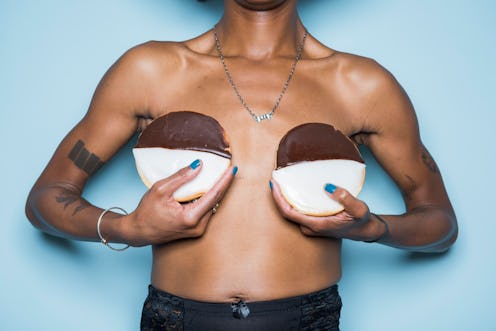
For those who get mastectomies, either to prevent breast cancer or to try to stop a current case, deciding whether or not to get breast reconstructive surgery afterwards is a major step in the recovery process — and for some women, choosing to get reconstruction might be a key factor in asserting ownership of their bodies: According to a new study from from Emory University, getting breast reconstruction after a mastectomy might improve women's sense of body image. But while these results are encouraging for those who do opt for reconstructive surgery, it's also important to remember that whether or not someone chooses to do so is a deeply personal choice — and no matter what decision a person makes, it's totally valid either way.
In order to explore the relationship between breast reconstructive surgery and body image, the researchers administered a survey asking about quality of life to 96 women who opted for the surgery immediately following their mastectomies. The results? For most of the participants, they felt their new breasts were just as significant to their body image as they were pre-op: 86 percent of women said that their breasts were "as important" to their sense of self-confidence after reconstructive surgery as they were before. 84 percent felt that their breasts were as important to feeling feminine, and 62 percent felt they were important to their sexuality. There were also some differences amongst the women in the study, however; for example, those over 50 were less likely to see their breasts as an important part of their femininity.
While this study and its results are important, there are obvious limitations to the research. Firstly, the study only included women who opted for reconstructive surgery, which could potentially have resulted in a sort of self-fulfilling prophecy — that is, the women who elected to have this surgery were happy with the results because they choose to undergo reconstruction in the first place. “Given that all of these women had opted to have reconstruction, it is not at all surprising that they valued having a breast mound,” Dr. Anees Chagpar, director of The Breast Center at Smillow Cancer Hospital at Yale-New Haven in Connecticut, told Rutgers. (Dr. Chagpar was uninvolved with the study itself.)
Dr. Chagpar later added more commentary about this via email to Rutgers, saying that those who opted for the surgery probably already felt their breasts were an important part of their sense of self: “I think the key point here is that women who choose reconstruction often do so because they feel that their breasts are important in terms of their femininity, sexuality, and body image... That reconstruction can help maintain some sense of normalcy for these women is well known.”
It's important to remember that having reconstructive surgery after a mastectomy is a very personal decision, and even though this study shows psychological benefits to opting for reconstruction, those who opt out aren't necessarily worse off for it, either. As BreastCancer.org puts it on their website, "The decision to reconstruct or not is very personal. There is no 'right way' to approach mastectomy and reconstruction (or lack of it). There is only the way that is best for you, your preferences, and your healing." Some feel that reconstruction is unnecessary; others don't want to have implants; and others may not have the resources available for it. Still others can't opt for reconstruction due to possible complications with radiation treatment, or because of possible side effects.
No matter what the case, says the National Cancer Institute, "Most women can choose their type of breast reconstruction method based on what is important to them" — and that, ultimately, is all that matters.
All in all, making the right decision for you and your body is important and needs to be respected by all; these are very private, personal decisions that can only be made by the individual person who's affected. No matter what those who have mastectomies decide to do afterwards, it's vital that we honor their choices.
Images: Andrew Zaeh for Bustle (2); Giphy